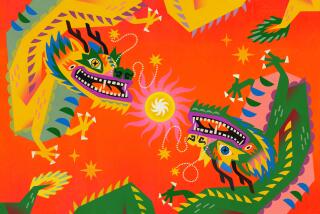Feng Shui : Spirits ‘Guide’ Hong Kong Businessmen
- Share via
HONG KONG — Beneath Hong Kong’s veneer of skyscrapers and button-down executives is a pervasive belief in “feng shui, “ a world of spirits and mysterious currents.
Feng shui is Chinese for wind and water. It is a concept of bringing man into harmony with his environment that dates back thousands of years. It is still taken seriously in corporate boardrooms as well as backwater villages.
It involves warding off evil spirits and analyzing “qi, “ the pervasive currents flowing through man and his surroundings. The landscape and the positioning of buildings and furniture help determine whether qi is good or bad.
The Hong Kong and Shanghai Bank, for example, dared not officially open its new headquarters last year without consulting a feng shui expert to determine a propitious date. It also followed his advice on where to place the bank’s two lion statues that local residents associate with Hong Kong’s prosperity.
“If something should go wrong and we didn’t consult the feng shui expert, then people will blame us for not observing the rule,” said Raymond Wu, a spokesman for the bank, which is this British colony’s leading financial institution.
Determine Health, Wealth
Chinese, who make up 98% of Hong Kong’s 5.5 million people, believe feng shui is critical in determining wealth and health.
People here consult feng shui diviners on such matters as business affairs, interior decorating and placement of family graves.
Nearly everyone in Hong Kong has a story to tell about bad feng shui--perhaps the sharp corner of a building pointing toward an office is responsible for a personal illness or business failure--and good feng shui. The Hong Kong and Shanghai Bank is said to lie on the vein of a dragon, an auspicious site.
The Hong Kong Land Co., the colony’s most prominent property firm, has feng shui experts look at building plans and makes revisions based on their reviews, said Martin Spurrier, the company’s former communications chief.
Protective Windows
For example, an expert found that the company’s Exchange Square office building housing the new stock market generally had good feng shui--protective mountains to the rear, the harbor in front and two towers that “were like the strong arms of a man reaching out to the skies for wealth which would pour in,” Spurrier said.
But the expert was concerned that all the money from heaven might not make it to the stock exchange.
“It was on his explicit recommendation that a skylight was put into the rotunda . . . so that money could flow straight through into the stock exchange,” Spurrier said.
“Rocky” Sung Siu-kwong, who has become popular through his television programs on feng shui, hurries from one appointment to the next to analyze residences and business offices.
He recently visited an empty, 700-square-foot suburban apartment purchased by the Ng family.
13 Fish, 2 Turtles
Equipped with a special compass, Sung found several feng shui problems and gave specific instructions on how to furnish the apartment: Two wood turtles would be needed to ward off bad influences from a nearby chimney; a painting of a peony above the sofa would help bring wealth; a tank in the living room filled with 13 fish (nine red, four silver) would absorb evil coming from the outside.
The family listened gravely, nodding their heads and taking copious notes, as Sung detailed the exact positioning for every piece of furniture.
Explained Sung: “Air flow inside a house is as important as blood circulation within a human body.”
Villagers in Hong Kong’s rural New Territories often are upset about construction that they feel will ruin good feng shui.
“Every time when you have a new development in the New Territories you are bound to have this headache,” said Tom Poon, a top official in the government’s Buildings and Land Department.
More to Read
Sign up for Essential California
The most important California stories and recommendations in your inbox every morning.
You may occasionally receive promotional content from the Los Angeles Times.










